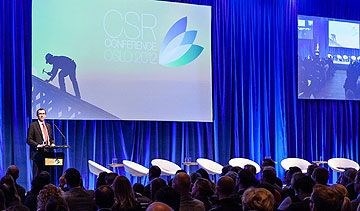Higher expectations of corporate social responsibility
Historical archive
Published under: Stoltenberg's 2nd Government
Publisher: Ministry of Foreign Affairs
News story | Date: 20/11/2012 | Last updated: 23/11/2012
To an increasing extent, consumers, employees and investors are expecting companies to demonstrate corporate social responsibility. At the same time, companies are preparing to establish operations in countries that are undergoing political upheaval. This was one of the topics discussed at the international conference on corporate social responsibility hosted by the Ministry of Foreign Affairs in Oslo on 13–14 November.
To an increasing extent, consumers, employees and investors are expecting companies to demonstrate corporate social responsibility. At the same time, companies are preparing to establish operations in countries that are undergoing political upheaval. This was one of the topics discussed at the international conference on corporate social responsibility hosted by the Ministry of Foreign Affairs in Oslo on 13–14 November.

Corporate social responsibility (CSR) is gaining new relevance as companies are preparing to establish operations in countries that have undergone political upheaval or that have changed course.
Having previously advised Norwegian companies not to operate in Myanmar, the Government is now encouraging them to do so.
“It is no longer a question of whether to enter new markets like Myanmar, but rather of how to enter them,” Minister of Foreign Affairs Espen Barth Eide said in his opening speech at the conference.
“However, Norwegian companies are required to observe the same ethical standards as they do at home, and to fulfil their responsibility to respect human rights,” Mr Eide said.
The conference focused on what we can do to close the gap between international CSR principles and the practices of small- and medium-sized enterprises when operating abroad. Civil society organisations, the media and the authorities all have key roles to play in these efforts.
CSR has made a difference, although much still remains to be done. In the future, the expectations of consumers, employees, investors and the general public with regard to CSR will in all likelihood increase. In turn, companies that make the connection between a good reputation and good sales figures will probably attach more importance to CSR.
Given the key role the business sector plays in value creation, conference participants argued in favour of a “smart mix” of voluntary guidelines, laws/regulations and incentives relating to companies’ CSR practices.